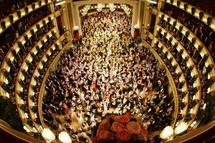Baroque is back: Handel's 'Alcina' storms Vienna State Opera
Simon Morgan
VIENNA, Simon Morgan- It's been over 40 years since a baroque opera was performed in the venerable Vienna State Opera.
Indeed, in the city of Mozart, Schubert, Beethoven and Strauss, baroque opera has always been treated as something of an ugly duckling, with its seemingly endless da-capo arias and hopelessly convoluted libretti.

And with the early music movement and period performance practice now an integral part of the repertoire of most of the world's other major opera houses, Vienna's new chief, Frenchman Dominique Meyer, thought it high time the house on the city's prestigious Ringstrasse should follow suit.
Nevertheless for such a venture to succeed -- Viennese audiences will gladly sit through six hours or more of Wagner without complaint, but balk at the idea of four hours of Handel -- Meyer had to have at least a couple of aces up his sleeve.
His first came in the choice of work: "Alcina" is one of the best-loved operas by George Frideric Handel (1685-1759), but which has never been performed at the Staatsoper before.
His next, and perhaps biggest, coup was to invite one of the world's best period instrument ensembles, Les Musiciens du Louvre-Grenoble, and their conductor Marc Minkowski to play in the pit, instead of the State Opera's house orchestra, which is largely made up of members of the Vienna Philharmonic.
That is hitherto unheard of in the history of the Staatsoper.
Another idea was to engage British theatre director and former director of the Royal Shakespeare Company, Adrian Noble, to stage "Alcina", with sets and costumes by award-winning designer, Anthony Ward.
Finally, with Minkowski currently one of the most sought-after conductors in the baroque repertoire, a top line-up of singers was guaranteed, including German soprano Anja Harteros in the title role, Bulgarian mezzo Vesselina Kasarova as Ruggiero, Argentinian soprano Veronica Cangemi as Morgana and Swedish mezzo Kristina Hammerstroem as Bradamante.
All of them have previously sung their roles to great critical acclaim in houses such as the Bavarian State Opera in Munich.
Thus, all the ingredients were there for the Staatsoper's first "Alcina" to be a runaway success and the premiere on Sunday was greeted with long and tumultuous applause.
For his reading, Noble places the action in the 18th century where the real-life Duchess of Devonshire, Georgiana Cavendish, has invited friends and family to a private performance of "Alcina" in her ballroom, with the Duchess herself taking the title role.
It is a simple, but ingenious idea, giving room for Ward's sumptuous visuals, which include a hot-air balloon landing in the Duchess's ballroom and and a huge field of vivid green, waist-high grass.
It also allows the solo instrumentalists of the superb Les Musiciens du Louvre-Grenoble -- who were also in costume dress -- to accompany the singers on stage during their concertino arias.
With her rich and heady soprano, Harteros was stunning as the sorceress Alcina who uses her supernatural powers to bewitch the knight Ruggiero and hold him captive as her lover.
Ruggiero is one of Kasarova's best-known roles and her deep mezzo was immaculate in the virtuosic coloratura.
But perhaps the biggest applause of the evening was reserved for Vienna Choir Boy, Shintaro Nakajima, who wowed the audience in the smaller role of Oberto, normally sung by a female soprano.
"Alcina" is being performed just five times until November 26 in the current season.
------------------------------------------------------------------------